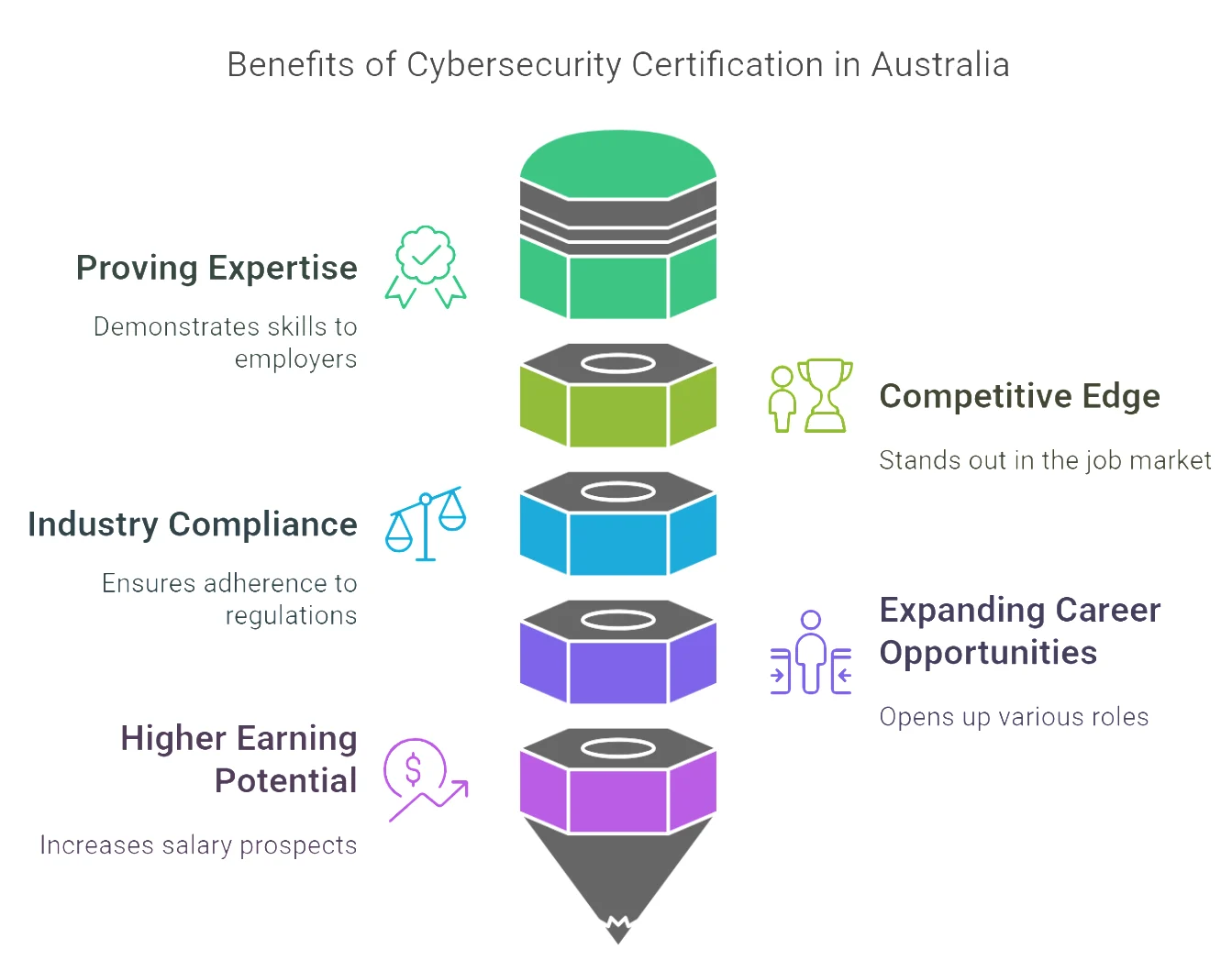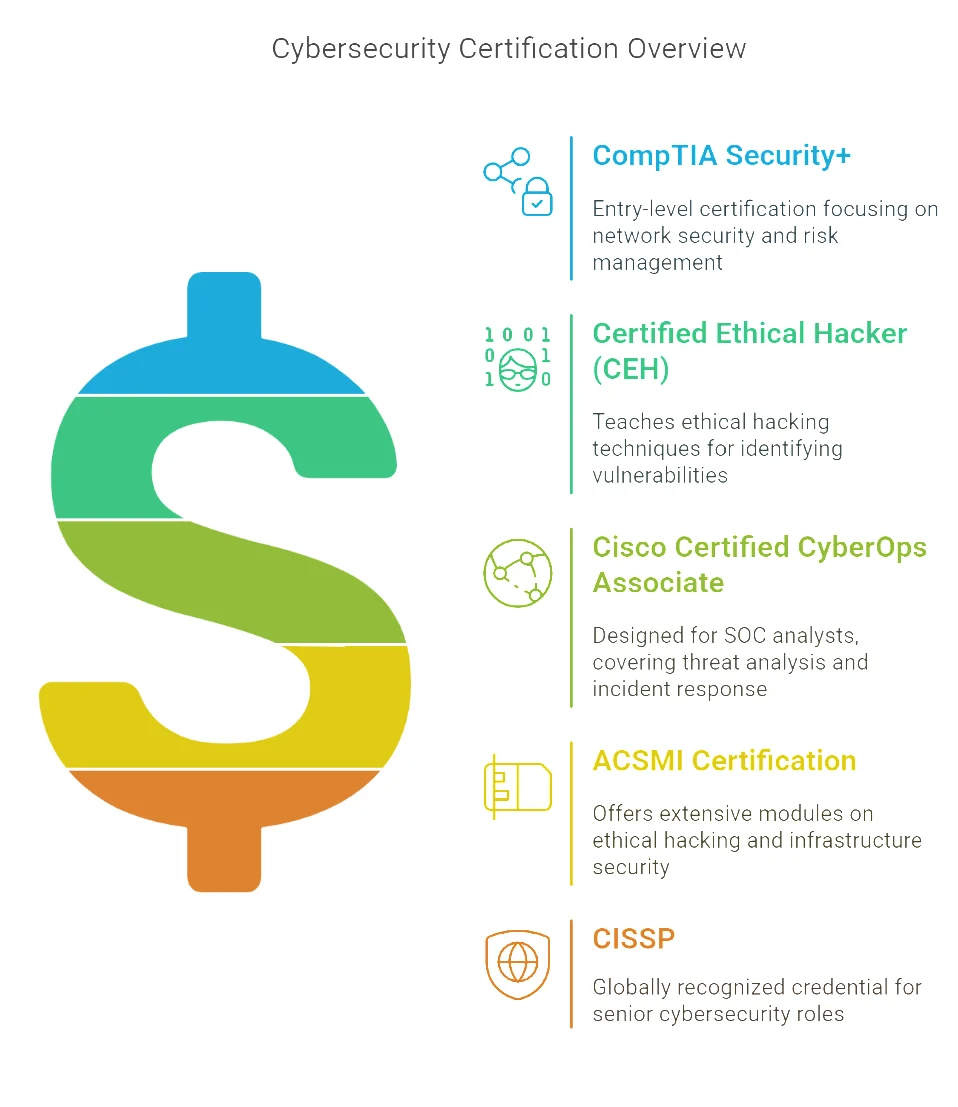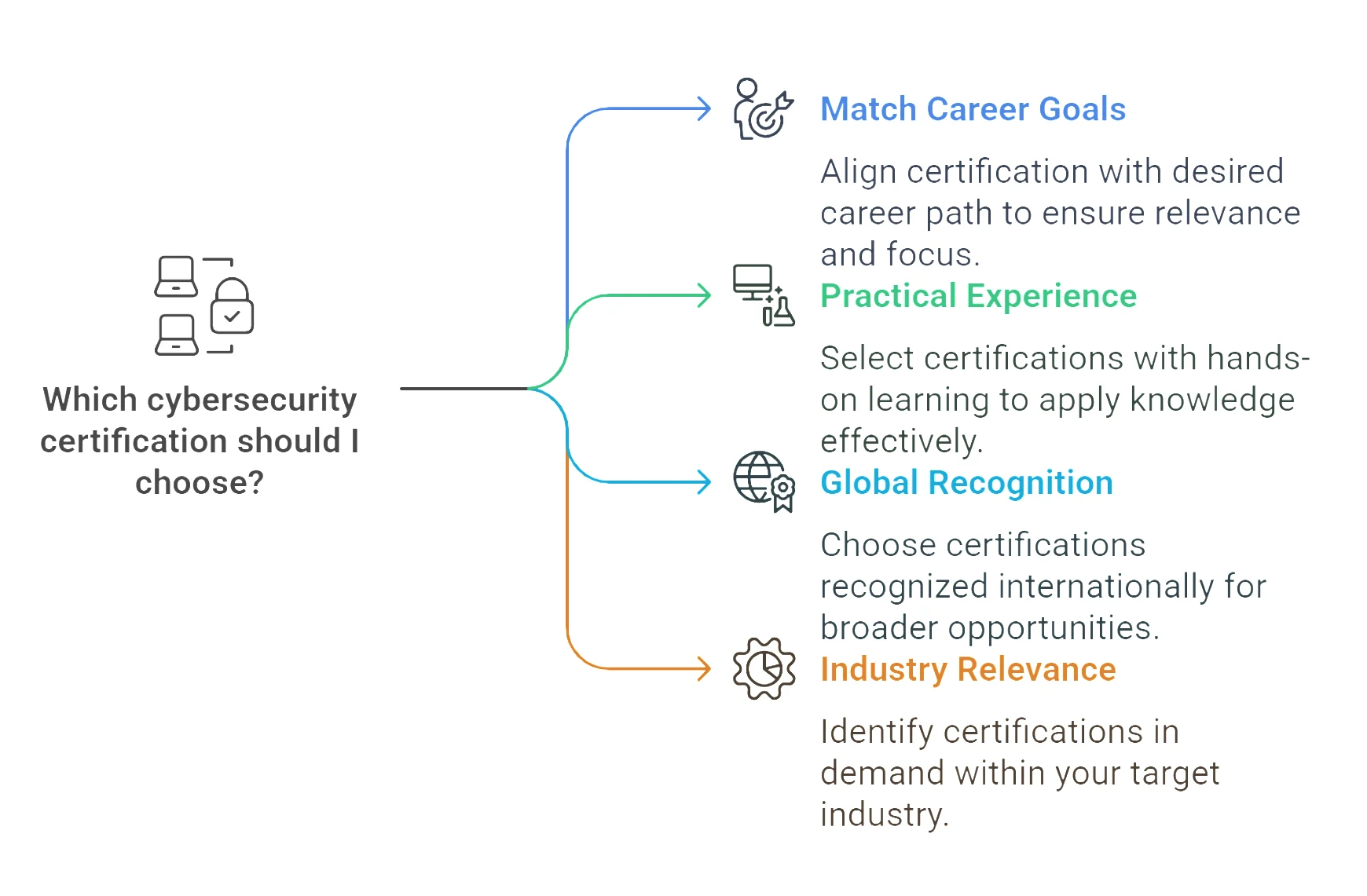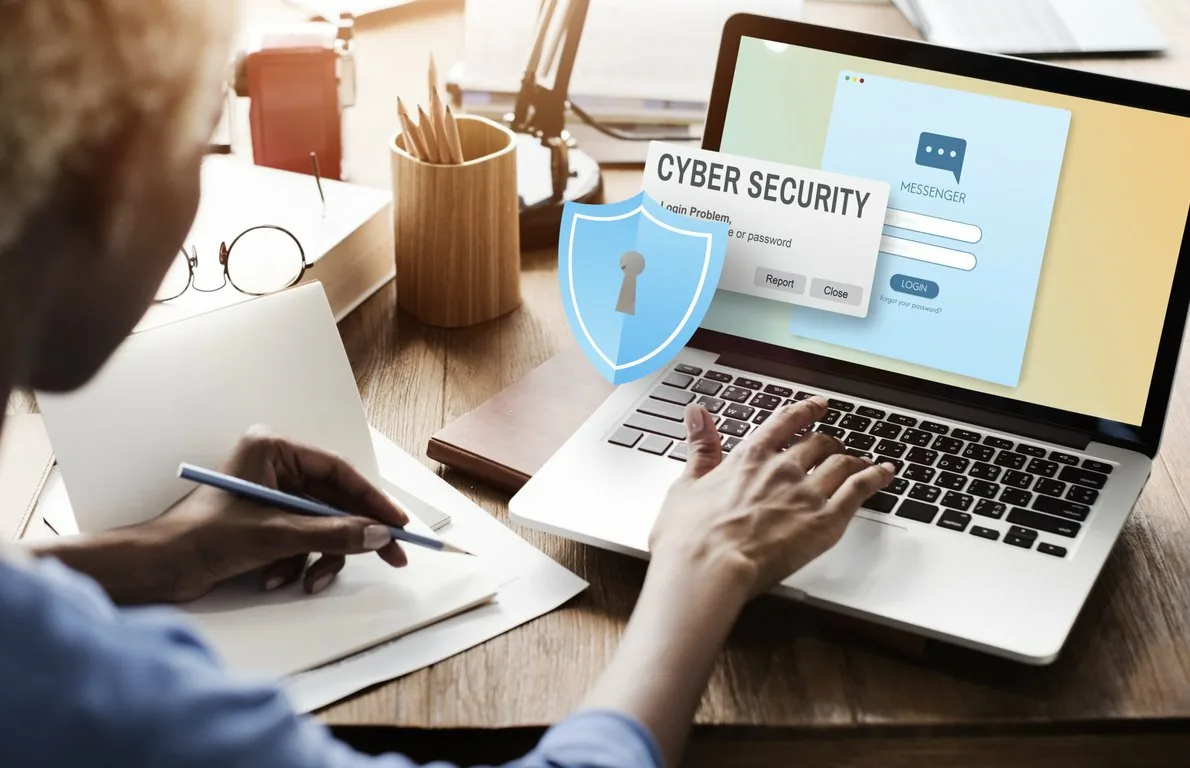Table of Contents
- Why Cybersecurity Is Critical for Australia
- What Is a Cybersecurity Certification?
- Why Pursue a Cybersecurity Certification in Australia?
- Top Cybersecurity Certifications in Australia
- Choosing the Right Certification
- The ROI on Cybersecurity Certifications
- Certifications Overview
- FAQs on Cybersecurity Certification in Australia
- Final Thoughts
As the world becomes more interconnected through digital platforms, cybersecurity has transitioned from a specialized IT concern to a national security priority. In Australia, where digital transformation is rapidly advancing, businesses and government agencies face escalating cyber threats. These attacks put sensitive data and essential services at risk, highlighting the urgent need for skilled professionals to defend critical infrastructure.
Security Technology Key Trends are shaping how these threats are addressed, influencing both defensive strategies and certification paths. Cybersecurity certification in Australia offers professionals the opportunity to gain the knowledge and practical skills needed to tackle these challenges. Whether you’re entering the cybersecurity field or looking to specialize, obtaining certification is a proven way to enhance your expertise and increase your marketability in Australia’s competitive job market.
Why Cybersecurity Is Critical for Australia
In Australia, cybersecurity is more than just an IT issue—it’s an essential component of the nation’s digital defense strategy. With rising concerns over ransomware attacks on healthcare institutions, data breaches in private enterprises, and hacktivism targeting government bodies, the need for cybersecurity professionals has never been more pressing.
This growing threat landscape has created an urgent demand for skilled cybersecurity experts, but there’s a challenge: there is a shortage of cybersecurity talent. According to AustCyber, thousands of roles remain unfilled nationwide. This gap has made certification programs even more critical for professionals looking to enter or advance in the field. A cybersecurity certification not only demonstrates your capabilities but also prepares you to meet the demands of Australia’s cybersecurity sector head-on.
What Is a Cybersecurity Certification?
A cybersecurity certification is a credential that verifies an individual’s expertise in securing systems, networks, and data from cyber threats. Unlike traditional academic degrees, which provide general knowledge, certifications focus on practical skills and real-world applications. They validate that a professional is capable of applying their knowledge to secure networks, detect vulnerabilities, and mitigate risks.
In Australia, cybersecurity certifications cover various domains such as ethical hacking, malware analysis, cloud security, and industrial control systems. Programs like the ACSMI certification offer over 400 specialized modules that cover a wide range of cybersecurity topics, from threat intelligence to advanced penetration testing.
Whether you’re new to cybersecurity or aiming to specialize in a particular field, these certifications help you build practical skills while ensuring you remain up to date with the latest cybersecurity trends and best practices.
Why Pursue a Cybersecurity Certification in Australia?
A cybersecurity certification in Australia provides numerous advantages, particularly in an environment where digital threats continue to evolve rapidly. Below are some of the key reasons why investing in a certification is essential for your career growth:

1. Proving Your Expertise
Cybersecurity certifications offer objective validation of your skills. They serve as proof to employers that you are equipped to handle cyber incidents, enhance security measures, and ensure compliance with local laws, such as Australia’s Privacy Act 1988. A certification lets employers know you possess the technical capabilities required to safeguard digital assets, which increases your credibility and employability.
2. Gaining a Competitive Edge
As the demand for cybersecurity professionals grows, cybersecurity jobs in Australia have become highly competitive. Certifications can give you a significant advantage over other candidates. With a certification, you stand out in the job market, demonstrating your specialized knowledge and making you an ideal candidate for positions like Security Analyst, Penetration Tester, and Compliance Officer.
3. Industry Compliance
Australia’s critical infrastructure industries, such as utilities, finance, and healthcare, must comply with regulatory frameworks like the Cybersecurity Strategy 2020. Employers within these sectors are prioritizing certified professionals who can ensure compliance with regulatory standards and protect organizations from cybersecurity risks. Earning a cybersecurity certification will allow you to meet these stringent requirements, making you an indispensable asset to your organization.
4. Expanding Career Opportunities
Whether you are just starting in the cybersecurity field or looking to advance your career, a certification opens up a variety of roles. Cybersecurity certifications equip you with the necessary tools to respond to evolving threats. By gaining a certification, you demonstrate your commitment to continuous learning and improve your job prospects, providing opportunities to enter or grow within the cybersecurity industry.
5. Higher Earning Potential
Professionals with cybersecurity certifications in Australia often earn higher salaries compared to their non-certified peers. For example, certifications such as CISSP, CEH, and ACSMI can boost earning potential, with some professionals commanding salaries of up to $150,000 per year. The increasing demand for skilled professionals, combined with the specialized knowledge certifications provide, allows you to negotiate a higher salary.
Top Cybersecurity Certifications in Australia
When considering cybersecurity certification Australia, it’s crucial to select the right program based on your current experience and career goals. Understanding Cyber Threats is a key component of these certifications. Below are some of the top certifications that will help you launch or advance your cybersecurity career:

1. CompTIA Security+
CompTIA Security+ is an entry-level certification that covers the fundamental principles of network security, risk management, and cryptography. It is ideal for individuals looking to build a strong foundation in cybersecurity.
- Ideal for: Entry-level IT professionals
- Focus Areas: Network security, threat management, and risk management
- Cost: Around $392
2. Certified Ethical Hacker (CEH)
The Certified Ethical Hacker (CEH) certification teaches individuals how to think like a hacker, offering practical skills to identify system vulnerabilities before malicious hackers can exploit them.
- Ideal for: Aspiring penetration testers and ethical hackers
- Focus Areas: Hacking methodologies, penetration testing tools, and attack strategies
- Cost: Around $1,199
3. Cisco Certified CyberOps Associate
Cisco’s CyberOps Associate certification is designed for those pursuing roles in Security Operations Centers (SOCs). It covers essential topics like SIEM tools, incident response, and threat analysis.
- Ideal for: SOC analysts and network security teams
- Focus Areas: Threat analysis, network defense, and incident response
- Cost: Around $300
4. ACSMI Certification
The ACSMI certification offers an extensive curriculum with over 400 modules, allowing professionals to gain a deep understanding of topics such as threat intelligence, advanced penetration testing, cloud security, and industrial control systems.
- Ideal for: Professionals at all levels, from beginners to seasoned experts
- Focus Areas: Ethical hacking, infrastructure security, and compliance
- Cost: Varies based on selected modules
5. Certified Information Systems Security Professional (CISSP)
The CISSP certification is a globally recognized credential that is often required for senior roles in cybersecurity, including Security Architect and Chief Information Security Officer (CISO).
- Ideal for: Experienced professionals and security leaders
- Focus Areas: Risk management, security governance, and security architecture
- Cost: Around $749 for the exam (excluding training fees)
Choosing the Right Certification
With so many options available, selecting the right certification can be challenging. Here are some key factors to consider when making your decision:

1. Match Your Goals
Before pursuing any certification, identify your career goals. Are you interested in penetration testing, network security, or incident response? The certification you choose should align with the career path you want to pursue.
2. Practical Experience
Look for certifications that offer hands-on learning and real-world simulations. Programs like ACSMI offer interactive labs and live scenarios that help you apply theoretical knowledge to practical challenges.
3. Global Recognition
Ensure that the certification you choose is recognized internationally. This will increase your mobility and open up opportunities in global markets.
4. Industry-Relevance
Different industries have different cybersecurity needs. Research which certifications are most in demand within your target industry, whether it’s finance, healthcare, critical infrastructure, or government.
The ROI on Cybersecurity Certifications
Investing in cybersecurity certifications can yield both tangible and intangible benefits. According to studies, professionals with cybersecurity certifications in Australia can earn 20-30% higher salaries compared to non-certified individuals. Certifications also lead to improved job stability, as they demonstrate your commitment to continuous learning and professional development.
Certified professionals often experience a faster path to career advancement, thanks to the specialized knowledge that comes with earning a certification. For example, ACSMI-certified professionals report higher earnings and greater job security due to their expertise in specialized fields like Industrial IoT security and cloud security.
Final Thoughts
The demand for cybersecurity professionals in Australia is stronger than ever. If you’re considering cybersecurity certification Australia, it’s a strategic investment in your career. Certifications validate your skills, improve your employability, and position you for better job opportunities, higher salaries, and greater career satisfaction.
Start your certification journey today and enhance your expertise in cybersecurity. By pairing your certification with comprehensive training from platforms like ACSMI, you’ll be well-equipped to lead the charge in defending against tomorrow’s cyber threats.
FAQs on Cybersecurity Certification in Australia
1. Is cybersecurity certification Australia suitable for beginners?
Yes. Entry-level certifications like CompTIA Security+ are ideal for beginners and provide a solid foundation in cybersecurity principles.
2. How long do certifications take to complete?
The duration varies. Entry-level certifications typically require 2-3 months of preparation, while more advanced certifications may take 6 months or longer.
3. What sets the ACSMI certification apart?
The ACSMI certification stands out for its hands-on modules, offering over 400 real-world scenarios that ensure you’re fully prepared for any cybersecurity challenge.
4. Are certifications better than a degree?
Both have merits. Certifications focus on practical skills and industry-relevant knowledge, while degrees offer broader foundational knowledge. Many professionals pursue both.
5. Are cybersecurity certifications worth the investment?
Absolutely. Certifications enhance earning potential, increase job stability, and provide career advancement opportunities by validating your expertise in a growing field.

Leave a Reply